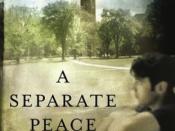In "A Separate Peace", John Knowles often uses the main protagonist, Gene Forrester, to convey crucial information on theme, motives, and leitmotifs. Knowles masterfully uses Gene's seemingly indecisive thoughts on war after Finny's death to convey significant thematic elements of the war. Through Gene's reflections, the reader can perceive Knowles' view of the war to be one not of hate and disgust, but of philosophical ponderings. Despite the atrocities that occur to certain characters in the novel caused by the war, it seems that the novel's overall perception of World War II is that it is not a destructor of purity and innocent, guileless enjoyment, but rather just a significant factor for the maturation and rapid ascent to adulthood of the Class of 1943.
Many readers, upon purveying A Separate Peace, will blatantly state that the war's effect is obviously pernicious. While it remains true that wars in general are malignant and detrimental to societies worldwide, this does not necessarily mean that Knowles intended A Separate Peace to be pointedly against the war.
Opposers may argue that Gene is clearly against the war, most of his comments are ambiguous. For example, towards the end of the novel Gene states, "When they began to feel that there was this overwhelmingly hostile thing in the world with them, then the simplicity and unity of their characters broke and they were not the same again" (194). Seemingly, this remark declares the war to be a hostile thing that destroyed the students' characters and simplicity, yet post-traumatic growth from war-related incidents seems to reoccur throughout the novel. The victims of the war only grow stronger from their experiences.
Gene's reflections on the war at the end of the novel convey important thematic information to the reader, especially on the post-traumatic growth of...


